Stakeholders: Flaws in legislation fuel minerals smuggling

What you need to know:
- Before going to Dodoma, an intending exporter must send the mineral consignment to the zonal mining office where the consignment is inspected, weighed and put in a sealed package.
- The exporter then pays royalty and inspection fees, after which the application forms and receipts are lodged electronically with the TMC head office in Dodoma.
- TMC then processes the application, and issues the requisite permit within seven days. The applicants has to go to Dodoma to collect the permit – or use an authorized agent who collects it on his/her behalf
Dar es Salaam. Delays in issuing permits that were occasioned by amendments to the mining legislation are partly to blame for the increasing cases of minerals smuggling, stakeholders say.
The delays started after the authority bestowed upon Zonal Mineral officers to issue permits for mineral exports was revoked in 2017 by changes in the Mining Act 2010, made through the Written Laws (Miscellaneous Amendments) Act, 2017.
The law now directs that export permits will be issued by the Tanzania Mining Commission (TMC) whose head office is located in Dodoma Region. This, stakeholders say, has created a loophole for smugglers.
Also, the fact that it is only the TMC executive secretary who is authorized to issue export permits for minerals complicates matters. In the event, they question the decision to vest so much power responsibilities upon a single individual.
These stakeholders’ views come only a few days after twelve people, including three police officers, were charged in court with attempting to smuggle 323.6 kilos of gold out of Tanzania on January 5 this year.
Speaking at the swearing-in ceremony of newly appointed government ministers and permanent secretaries in Dar es Salaam last week, President John Magufuli blamed mineral smuggling, mainly done by artisanal miners, on failure of the Minerals ministry to establish mineral centres across the country.
The secretary general of the National Union for Mines and Energy Workers of Tanzania (NUMET), Nicomedes Kajungu, says the amendments to the mining legislation should be revisited to enable greater efficiency in controlling the export of minerals from the country.
Other stakeholders claim that the amendments only served to increase bureaucracy, thereby making that much more difficult to obtain export permits.
“Changes in the law have only fueled the problem of minerals smuggling. And it was unfortunate that the amendments were passed under a certificate of urgency, which blocked all room for wide consultations with stakeholders,” said a senior official with the Tanzania Chamber of Energy and Minerals (TCEM) who asked for anonymity on grounds that he is not the Chamber’s spokesperson.
The TMC executive secretary, Prof Shukrani Manya, disagrees with the claims that centralizing the issuing of mineral export permits is the cause for increased smuggling.
Postulating that “smuggling is done by unscrupulous traders who would do it anyway,” Prof Manya said “we should not associate centralizing issuance of export permits with smuggling of minerals out of the country – which, by the way, is a costly affair, considering the punishment involved when a smuggler is caught.”
Prof Manya also categorically stated that it takes less than seven days to issue a minerals export permit when all the procedures have been followed.
The only complication associated with centralising the issuance of mineral permits is that the exporter must collect the permit from Dodoma, or use an approved agent to collect it on their behalf, Prof Manya explained – adding: “how fast the applicants collect their permits in Dodoma depends on which corner of the country they come from.”
Stressing that the duty of TMC is to implement the law, Prof Manya said “we are also monitoring challenges that are associated with implementing the law – and, in due course, we will report to the relevant authorities for solutions.”
The regional manager for East and Southern Africa at the Natural Resource Governance Institute (NRGI), Silas Olang, says what is needed is for both miners and supervisors to be diligent and honest – and always avoid shortcuts.




